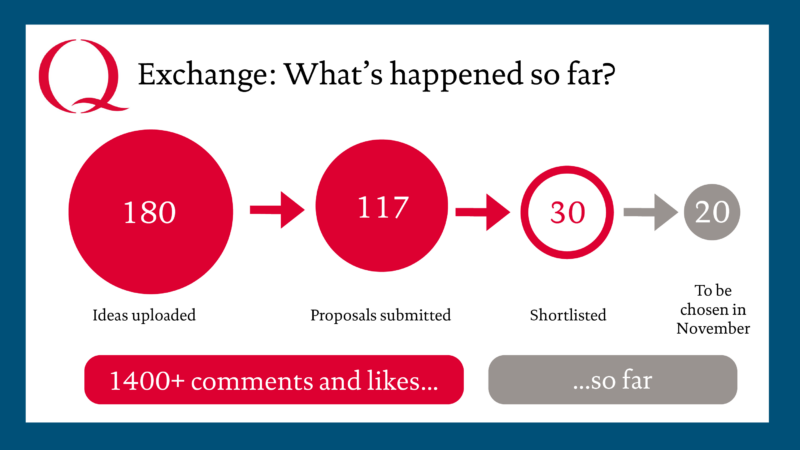The Q Exchange programme has just finished the difficult job of shortlisting. 37 Q members helped to select 30 exciting projects from the 117 ideas submitted: these projects will go to the whole Q Community to choose the winning 20 projects in October.
 A key principle of Q Exchange is that we’re transparent throughout, so that everyone can learn through the process. With that in mind we thought we’d share a few reflections on what marked out the winning teams and key areas that teams can consider to help strengthen their proposals. Many of these points apply to all Q Exchange applicants and will be relevant to anyone developing a project proposal in future.
A key principle of Q Exchange is that we’re transparent throughout, so that everyone can learn through the process. With that in mind we thought we’d share a few reflections on what marked out the winning teams and key areas that teams can consider to help strengthen their proposals. Many of these points apply to all Q Exchange applicants and will be relevant to anyone developing a project proposal in future.
The Q member panels who helped choose the shortlist highlighted many reasons for their selections. In general, the shortlisted projects stood out for being compelling ideas with a clear description of the problem they’re trying to address. They were also clear about how their approach to change will help beneficiaries in pragmatic and creative ways. They went beyond business as usual and reached across boundaries and into new areas. Take a look at the 30 shortlisted projects and comment on the pages to continue to help shape their projects.
While it’s a great shortlist, everyone can improve. In terms of how the projects could be even better, a key message from the final shortlisting panels was to think from the perspective of those who will read your proposal. Readers want to understand quickly what your project is about and the difference it can make not just for your area, but for them and the wider system.
- Make sure your opening really explains and sells your project.
- Explain how your project could lead to insights or impact beyond your local area in time. You can strengthen this by:
- Being explicit about the ways the change or learning from the project could spread. Could people do the same thing in a different service area or part of the UK? Could the general methodology or approach you’re using be helpful in a completely different setting?
- Considering whether there are national organisations or networks that might help promote your work or become an informal partner in what you’re doing.
- Explaining how you will share back with the Q Community and use the community infrastructure to help the ideas spread. Being linked to Q is part of the benefit of Q Exchange, so make the most of it.
- Outline about how your project could help organisations meet priorities in the system and, if possible, how it can be delivered within available resources.
- Explain briefly how your project builds on stakeholder engagement, evidence or work that’s already been done, both locally and elsewhere. It’s generally more credible to describe when this has been tried before than to avoid mentioning it, so the idea seems more innovative.
- People want to see projects that are exciting but realistic, so don’t feel pressure to over-claim how much you can deliver. Remember that it takes time to build the engagement and iterate ideas, so it’s OK for timescales and outcomes to be a bit flexible.
The shortlisted teams will be working to refine their project pages over the next couple of weeks. If you’ve got suggestions for how you think they could be even better, the comments function is now live again on the website. Drop them a line!
Next steps
Online voting will open for Q Exchange on Monday 7 October and will close at 12:00 on Monday 21 October. Winners will be announced at the UK-wide Q community event on Wednesday 13 November.